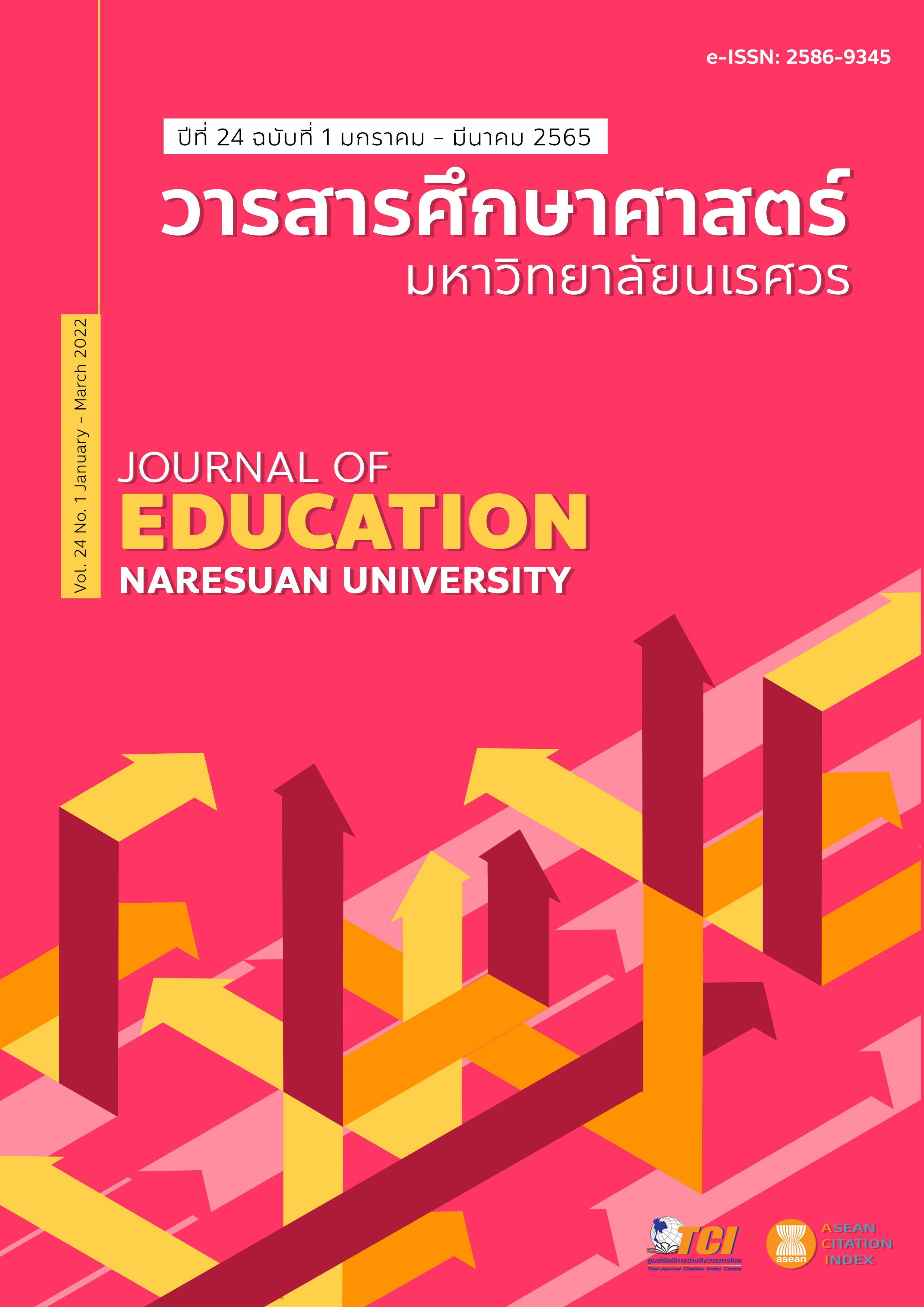MODELING PRACTICE AND USE IN SCIENCE CLASSROOM การสร้างและใช้แบบจำลองในห้องเรียนวิทยาศาสตร์
Main Article Content
Abstract
Doing science as modeling practice aims to foster students’ thinking as scientists who create models for explaining or/and predicting natural phenomena and being scientific inquiry tools. On the other hand, from intensive literature review, science teachers also have misunderstood of scientific modeling, and then understood the goals and roles of models and used them inappropriately compared to the scientists do. For example, teachers understand that models are used as a tool for communicating scientific concepts that are invisible with the naked eye, or process complexity rather than as a tool for developing scientific knowledge. Therefore, the purpose of this study is to explain about modeling practice and how to effectively use in a science classroom in line with the work of scientists. The author then would like to present how scientists create models and in what way science teachers’ understanding of the nature of model, modeling and their use in a science classroom. The authors hope that the findings of this review will be useful to science teachers for using models as scientists use. Researchers, science educators and others could take the findings for enhancing teachers, students, or curriculum designers on modeling practice.
Article Details

This work is licensed under a Creative Commons Attribution-NonCommercial-NoDerivatives 4.0 International License.
The owner of the article does not copy or violate any of its copyright. If any copyright infringement occurs or prosecution, in any case, the Editorial Board is not involved in all the rights to the owner of the article to be performed.
References
Barak, M., & Hussein-Farraj, R. (2013). Integrating model-based learning and animations for enhancing students’ understanding of proteins structure and function. Research in Science Education, 43(2), 619-636.
Crawford, B. A., & Flanagan, K. P. (2019). Teachers’ Views About Models and Modeling Competence Towards Developing Scientific Literacy in Young People. In Towards a Competence-Based View on Models and Modeling in Science Education (pp. 163-179). Springer.
Faikhamta, C., & Supatchaiyawong, P. (2014). Model-Based Learning. Kasetsart Educational Review, 29(3), 86-99. [in Thai]
Gilbert, J. K. (2004). Models and modelling: Routes to more authentic science education. International Journal of Science and Mathematics Education, 2(2), 115-130.
Gilbert, J. K., & Justi, R. (2016). Modelling-based teaching in science education (models and modeling in science education, 9). New York: Springer.
Gobert, J. D., & Buckley, B. C. (2000). Introduction to model-based teaching and learning in science education. International Journal of Science Education, 22(9), 891-894.
Gogolin, S., & Krüger, D. (2018). Students' understanding of the nature and purpose of models. Journal of Research in Science Teaching, 55(9), 1313-1338.
Gouvea, J., & Passmore, C. (2017). Models of ‘versus ‘Models for. Science & Education, 26(1-2), 49-63.
Grosslight, L., Unger, C., Jay, E., & Smith, C. L. (1991). Understanding models and their use in science: Conceptions of middle and high school students and experts. Journal of Research in Science Teaching, 28(9), 799-822.
Grünkorn, J., zu Belzen, A. U., & Krüger, D. (2014). Assessing students' understandings of biological models and their use in science to evaluate a theoretical framework. International Journal of Science Education, 36(10), 1651-1684.
Harrison, A. G., & Treagust, D. F. (2000). A typology of school science models. International Journal of Science Education, 22(9), 1011-1026.
Hodson, D. (2014). Learning science, learning about science, doing science: Different goals demand different learning methods. International Journal of Science Education, 36(15), 2534-2553.
Ke, L., & Schwarz, C. V. (2020). Supporting students' meaningful engagement in scientific modeling through epistemological messages: A case study of contrasting teaching approaches. Journal of Research in Science Teaching, 58(3), 335-365. https://doi.org/10.1002/tea.21662
Kite, V., Park, S., McCance, K., & Seung, E. (2020). Secondary Science Teachers’ Understandings of the Epistemic Nature of Science Practices. Journal of Science Teacher Education, 1-22.
Ladachart, L., & Ladachart, L. (2017). Science Teachers’ Perspectives on and Understandings about Scientific Models. Journal of Community Development Research (Humanities and Social Sciences), 10(3), 149-162. [In Thai]
Markauskaite, L., Kelly, N., & Jacobson, M. J. (2020). Model-based knowing: How do students ground their understanding about climate systems in agent-based computer models? Research in Science Education, 50(1), 53-77.
NGSS Lead States. (2013). Next Generation Science Standards: For states, by states. Washington: The National Academies Press.
Oh, P. S., & Oh, S. J. (2011). What teachers of science need to know about models: An overview. International Journal of Science Education, 33(8), 1109-1130.
Osborne, J. (2014). Teaching scientific practices: Meeting the challenge of change. Journal of Science Teacher Education, 25(2), 177-196.
Organization for Economic Co-operation and Development [OECD]. (2016). PISA 2015 assessment and analytical framework: Science, reading, mathematics and financial literacy. Paris: Author.
Soulios, I., & Psillos, D. (2016). Enhancing student teachers’ epistemological beliefs about models and conceptual understanding through a model-based inquiry process. International Journal of Science Education, 38(7), 1212-1233.
The Institute for the Promotion of Teaching Science and Technology [IPST]. (2018). Manual for Basic Science Curriculum, Department oi Science (Revised edition 2018) according to the basic education core curriculum, B.E. 2551, primary school]. Retrieved from http://scimath.org/e-books/8923/flippingbook/index.html [in Thai]
Tro, N. J. (2010). Principles of chemistry: A molecular approach: Prentice Hall, NJ: Upper Saddle River.
Van Der Valk, T., Van Driel, J. H., & De Vos, W. (2007). Common characteristics of models in present-day scientific practice. Research in Science Education, 37(4), 469-488.
Windschitl, M., & Thompson, J. (2006). Transcending simple forms of school science investigation: The impact of preservice instruction on teachers’ understandings of model-based inquiry. American Educational Research Journal, 43(4), 783-835.
Windschitl, M., Thompson, J., & Braaten, M. (2008). How novice science teachers appropriate epistemic discourses around model-based inquiry for use in classrooms. Cognition and Instruction, 26(3), 310-378.
zu Belzen, A. U., Krüger, D., & van Driel, J. (2019). Towards a competence-based view on models and modeling in science education. New York: Springer.


